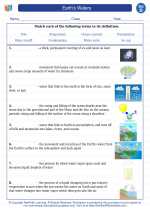Introduction to Physics
Physics is the science that deals with the properties and interactions of matter and energy. It is a fundamental natural science that seeks to understand the behavior of the universe, from the smallest subatomic particles to the largest galaxies.
Key Concepts in Physics
1. Matter and Energy
Matter is anything that has mass and takes up space, while energy is the ability to do work. In physics, these two fundamental concepts are intertwined, as matter can be converted into energy and vice versa.
2. Forces and Motion
Physics studies the various forces that act on objects and how they affect the motion of those objects. This includes concepts such as gravity, friction, and the laws of motion formulated by Sir Isaac Newton.
3. Waves and Optics
Waves are disturbances that carry energy from one place to another without permanently displacing the medium through which they travel. Optics deals with the behavior and properties of light, including reflection, refraction, and the formation of images.
4. Electricity and Magnetism
Electricity and magnetism are closely related phenomena that form the basis of many modern technologies. Concepts in this area of physics include electric circuits, electromagnetic induction, and the behavior of magnetic fields.
5. Thermodynamics
Thermodynamics is the study of heat and its relation to energy and work. This branch of physics deals with concepts such as temperature, heat transfer, and the laws of thermodynamics.
Study Guide
Here are some key concepts and topics to focus on when studying physics:
- Understand the basic principles of matter and energy, including the concept of mass-energy equivalence.
- Learn about the different types of forces and how they affect the motion of objects, including the laws of motion.
- Explore the behavior of waves and optics, including the nature of light and the properties of different wave phenomena.
- Study the fundamentals of electricity and magnetism, including the behavior of electric and magnetic fields.
- Gain an understanding of thermodynamics and its relevance to energy transfer and the behavior of systems.
Additionally, practicing problem-solving and critical thinking skills will be essential for mastering the concepts of physics. Experimentation and hands-on activities can also help reinforce theoretical knowledge.
Remember to seek out resources such as textbooks, online tutorials, and educational videos to supplement your learning. Physics can be a challenging subject, but with dedication and effort, you can develop a deep understanding of the fundamental laws that govern the universe.
[Physics] Related Worksheets and Study Guides:
.◂Science Worksheets and Study Guides Fourth Grade. Earth's Waters

 Worksheet/Answer key
Worksheet/Answer key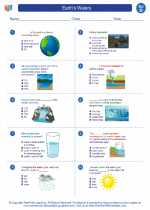
 Worksheet/Answer key
Worksheet/Answer key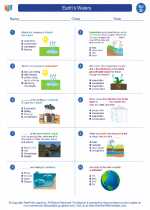
 Worksheet/Answer key
Worksheet/Answer key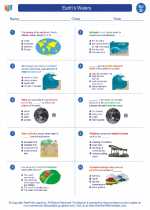
 Vocabulary/Answer key
Vocabulary/Answer key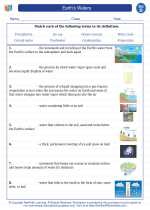
 Vocabulary/Answer key
Vocabulary/Answer key